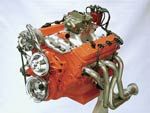
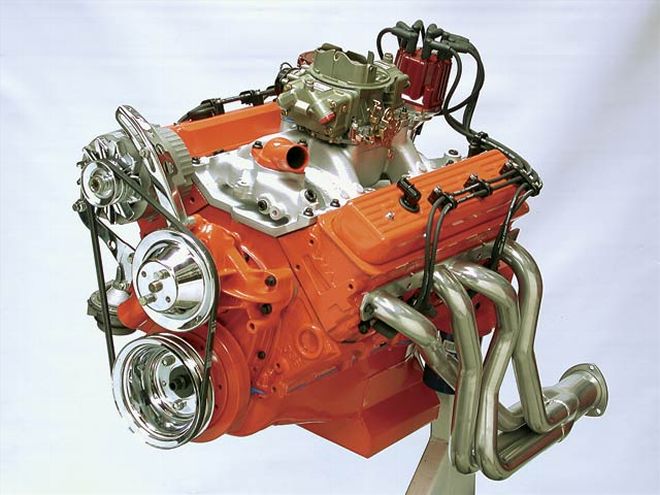
Yeah, big 600-plus horsepower numbers are mighty impressive on magazine covers, and those monster lumpy cams will wow all the pretenders at the burger stand on Friday night. But those are wild, wish-book engines that few of us can afford. So let's talk about a street small-block that just about anybody can squeeze out of his wallet.
Powerhouse is a company out of Bakersfield, California, that has been offering stoker engine kits for over 19 years. The 383ci small-block Chevy is its most prolific offering and therefore also the most affordable. Amazingly, you can pick up a stroker small-block Chevy rotator kit from Powerhouse for as little as $580. That's the basic kit, but it does get you a crank, rods, pistons, rings, and bearings, plus a few more pieces. That sounded almost too good to be true, so we decided to build one for ourselves.
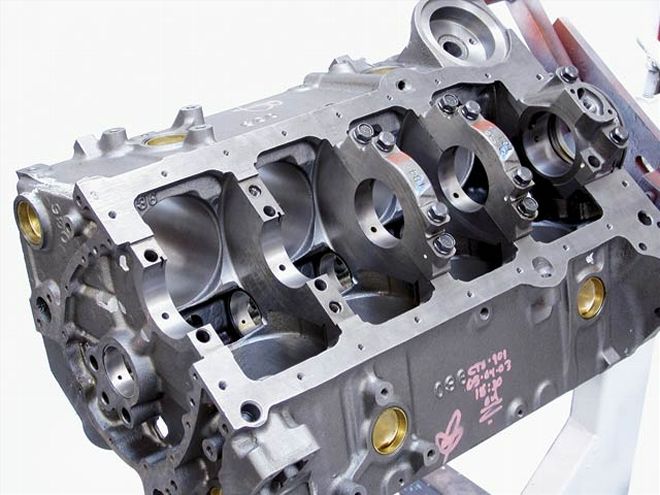 We opted for a brand-new GM Performance Parts two-piece rear main seal, four-bolt main block rather than search for a good used core. JGM then torque-plate honed the cylinders and knocked in the cam bearings for us.
We opted for a brand-new GM Performance Parts two-piece rear main seal, four-bolt main block rather than search for a good used core. JGM then torque-plate honed the cylinders and knocked in the cam bearings for us.
Parts and Pieces
The Powerhouse rotating assembly consists of a brand-new crank, rebuilt production 5.7-inch connecting rods, and a set of dished hypereutectic pistons, rings, bearings, and a gasket set. For a few more bucks you can also add balancing, a new, externally balanced Pioneer dampner, and a Pioneer flexplate. Because this is a stroker package, CC's engine master Ed Taylor took a die-grinder to the block's pan rails to ensure the rods would clear. Powerhouse also trimmed the rod bolts to ensure that the rods would clear the camshaft. Finally, Jim Grubbs Motorsports, in Valencia, California, did an excellent job of torque-plate honing to fit the pistons and installing our cam bearings.
Since this is a street engine with a budget focus, we also opted for a set of stock iron Vortec heads. While these heads may sound boring, don't be fooled. Vortecs offer excellent flow for their small 1.94/1.50-inch valve size and, combined with an excellent 64cc combustion chamber, can make outstanding power. All we did was exchange the stock valvesprings for a set of Pioneer conical type springs and elongate the pushrod holes to accommodate the additional lift from the Pioneer 1.6:1 stamped rockers.
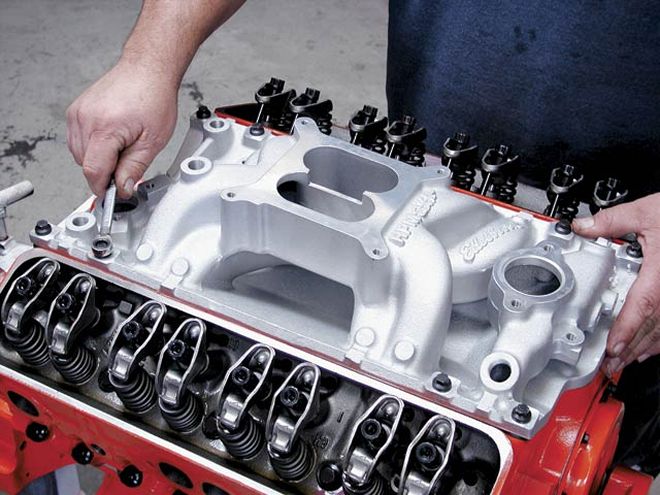 This is the upgraded Powerhouse rotating assembly kit complete with the crank, hypereutectic dished pistons, resized rods, rings, bearings, balancer, and flexplate. This kit also includes a complete gasket set, and the rotating assembly has been balanced.
This is the upgraded Powerhouse rotating assembly kit complete with the crank, hypereutectic dished pistons, resized rods, rings, bearings, balancer, and flexplate. This kit also includes a complete gasket set, and the rotating assembly has been balanced.
To top off our small-block exercise, we chose an Edelbrock Performer Vortec RPM Air Gap intake since we've yet to find a manifold that will beat it when it comes to making both torque and horsepower. See, we're greedy-we want it all. For a carburetor, we stepped up to a Quick Fuel Technologies 750 vacuum secondary carburetor with an electric choke that would ensure good power while still delivering the kind of throttle response and street manners that we've come to expect.
Taylor took his time assembling the Powerhouse 383, ensuring that we had no problems with either the rods and cam or between the rods and the block. Taylor also measured all bearing clearances, crank endplay, and rod side clearances during this trial assembly period to ensure that all the clearances were within spec. This paid off because he did have to make some minor adjustments to bearing clearances, and one pair of rods measured too tight for side clearance, but these are typical issues that were easily remedied.
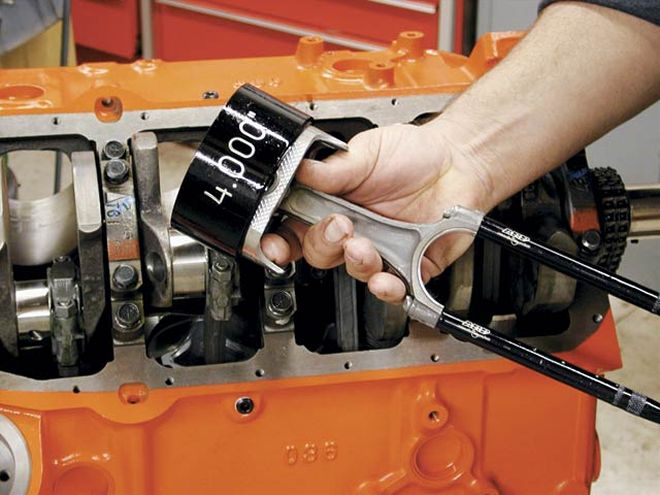 After checking all the clearances, Taylor assembled the Powerhouse 383 using ARP fasteners and also using an ARP tapered ring compressor that makes installing the pistons very easy.
After checking all the clearances, Taylor assembled the Powerhouse 383 using ARP fasteners and also using an ARP tapered ring compressor that makes installing the pistons very easy.
Test Day
Once Taylor had the Powerhouse 383 fully assembled and pressure-lubed, it went up on the Digilog dyno at Kenny Duttweiler's shop along with a set of 15⁄8-inch Hooker headers muffled with a pair of 21⁄2-inch pipes leading to a set of Flowmaster street mufflers. After completing the break-in period for the cam and rechecking the valve lash to ensure nothing changed, we were ready to test.
After the engine was content on 91-octane pump gas with 34 degrees of total ignition timing, the real fun started. Taylor pulled the handle on the dyno and watched as our Powerhouse budget Mouse lived up to its name with 444 lb-ft of torque at 3,600 rpm and a peak power rating of 375 hp at a very conservative 5,400 rpm. As you can see from the Power Curve chart, the engine averaged 404 lb-ft of torque throughout the entire rpm band from 2,200 to 5,800 rpm while delivering a respectable 1,800-rpm power band between peak torque and peak horsepower.
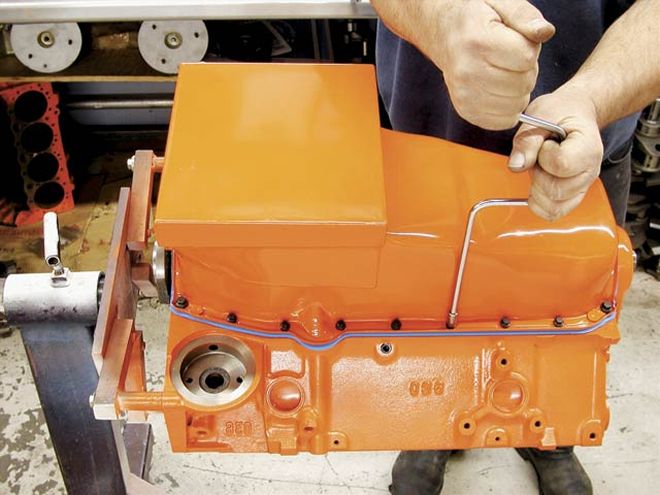 While a stock oil pan would work fine, we opted for a reasonably priced Hamburger oil pan from Trans-Dapt that also included a custom pickup.
While a stock oil pan would work fine, we opted for a reasonably priced Hamburger oil pan from Trans-Dapt that also included a custom pickup.
Just to show you what this is worth in the car, we plugged this exact power curve into the Racing Systems Analysis Quarter Pro dragstrip simulation program using a 3,700-pound car with a 3.55 gear, 2,600-rpm stall speed converter, TH350 trans, 26x9-inch sticky M/T tires and shifting at 6,000 rpm. We simulated the car at sea level on a 77-degree day, which is very good air. Amazingly, even with this heavy car and only 3.55 gears, the simulation spit out a respectable [email protected] pass with a 1.87-second 60-foot time.
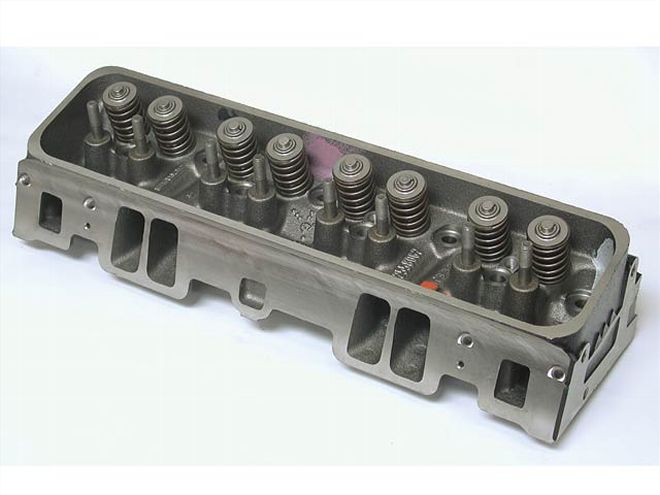 Airflow is where the power is, and for the money, it's impossible to beat the performance of a set of GM Performance Part iron Vortec heads. Taylor elongates the pushrod holes inboard to ensure no pushrod interference when using the Pioneer 1.6:1 rockers.
Airflow is where the power is, and for the money, it's impossible to beat the performance of a set of GM Performance Part iron Vortec heads. Taylor elongates the pushrod holes inboard to ensure no pushrod interference when using the Pioneer 1.6:1 rockers.
Conclusion
Even with the new parts we used, you could duplicate a similar long-block with Powerhouse parts (including the Vortec heads) for well under $2,000. Crank in a bigger cam and the horsepower will climb, but it will also sacrifice torque. As it is, this is a great package with an idle vacuum of almost 13 inches at 750 rpm, making this engine very driveable in almost any kind of street application. There's never been a better time than right now to build a stout 375hp first-generation small-block Chevy engine. CC
Cam SpecsCamAdvertised DurationDurationLiftLobe@ 0.0501.5:1 (1.6:1)Sep.Isky 270/280 Int.2702210.465 (0.496)112Flat-tappet hyd. Exh.2802320.485 (0.517)
 We were after torque as well as horsepower, and that's where the Edelbrock Performer RPM Vortec Air Gap intake really shines. We've yet to find an intake that will best this manifold for overall power.
We were after torque as well as horsepower, and that's where the Edelbrock Performer RPM Vortec Air Gap intake really shines. We've yet to find an intake that will best this manifold for overall power.
Power Curve Powermaster 383 RPMTQHP 2,200379159 2,400387177 2,600399198 2,800408217 3,000415237 3,200427260 3,400440285 3,600444304 3,800443320 4,000440335 4,200438350 4,400430360 4,600420368 4,800409373 5,000394375 5,200377374 5,400365375 5,600340362 5,800323357 Peak444375 Avg404304
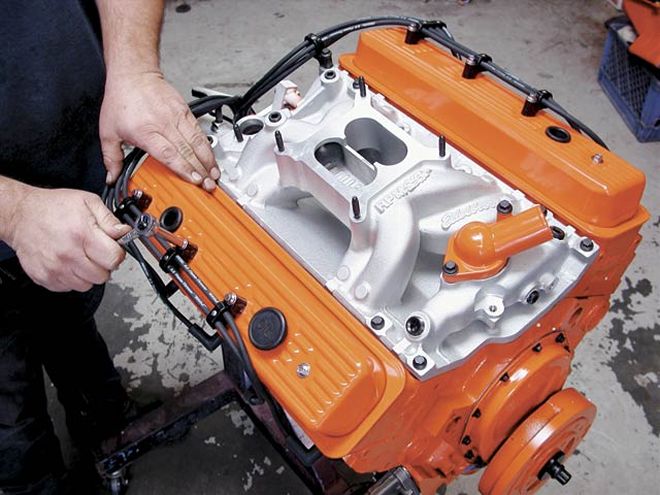 We were after torque as well as horsepower, and that's where the Edelbrock Performer RPM Vortec Air Gap intake really shines. We've yet to find an intake that will best this manifold for overall power.
We were after torque as well as horsepower, and that's where the Edelbrock Performer RPM Vortec Air Gap intake really shines. We've yet to find an intake that will best this manifold for overall power.
Parts List
The following part numbers are the major components we used to assemble this small-block. The Powerhouse component prices are from Powerhouse while the GM Performance Parts block and Vortec head costs are from Scoggin-Dickey Performance Center. The remaining component prices come from various other readily available sources.ComponentManufacturerPNPriceCylinder block, 350GMPP10066034$580Cylinder heads, VortecGMPP12558060 500383 Engine kitPowerhouse383-SK 489w/balance, balancer& flexplate 199CamshaftIsky20127/281-12 109Lifters, anti-pump upPowerhouse817R 40Rocker arms, 1.6, railPioneer818020 (4) 81PushrodsPioneer815205 (16) 96Valvesprings, conicalPioneer810109 (4) 34RetainersPioneer817109 97Freeze plugs, brassPioneerPE100BR 11Intake, Vortec RPM AGEdelbrock7516 226Carburetor, 750 cfmQuick Fuel750 Pro Vac 350Distributor PertronixD100701 220Plug wires, 8mmPertronix804280 31Oil pumpMelling M55 14Oil pan & pickupTrans Dapt0168 185Timing chain coverTrans Dapt9915 28Water neckTrans Dapt9929 12Valve covers, coatedTrans Dapt9919 95Water pump pulley, LWPTrans Dapt9604 29Crank pulley, LWPTrans Dapt9607 50Alternator bracket, upperTrans Dapt9320 16Alternator bracket, lowerTrans Dapt9637 7Distributor, FlamethrowerPertronixD100701 220Plug wires, 7mmPertronix708180 47Block machiningJGM - 135Install cam bearingsJGM - 44